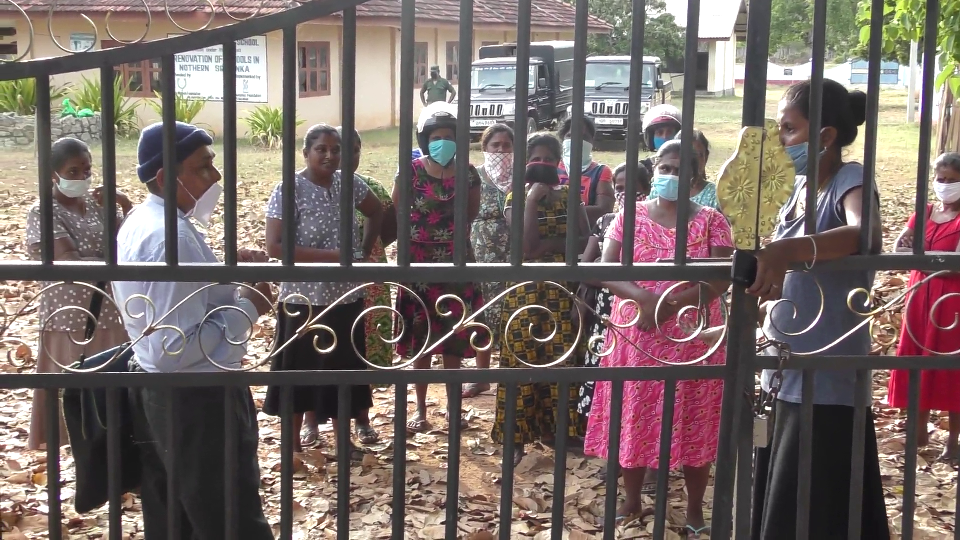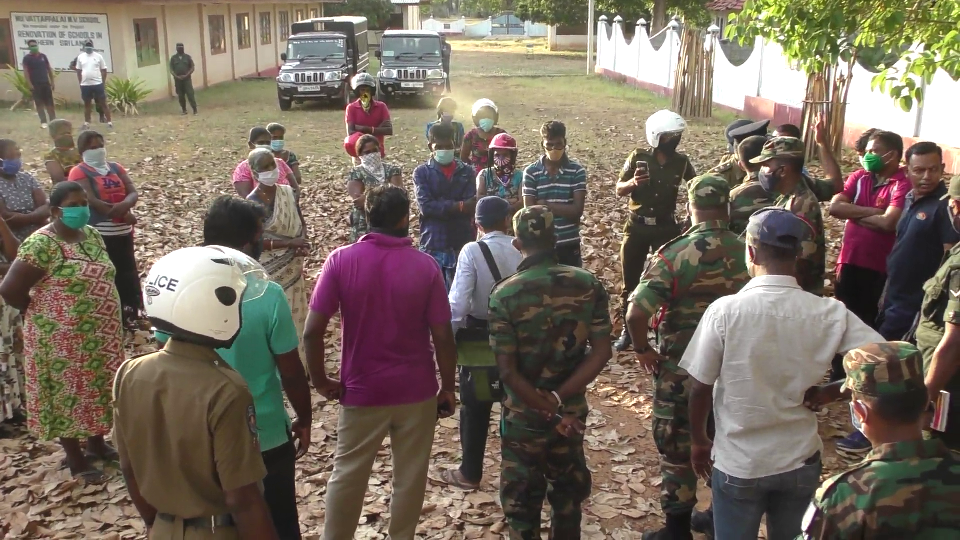Sri Lanka is currently using its military forces to seize schools and educational establishments in the Northern Province, to quietly convert into Quarantine Centres (QC’s) for returning navy personnel from the South at risk of the coronavirus (COVID-19).
Around 4000 navy officers who were serving in the Welisara Navy Camp, and their families, have been instructed to isolate themselves after multiple navy personnel tested positive for COVID-19. A navy officer from Vavuniya, serving in the Welisara Navy Camp returned to Vavuniya and tested positive for COVID-19. Earlier this week, over 300 navy personnel tested positive for COVID-19, with tests still being carried out.
However, instead of keeping these officers and their families closely monitored in centres near the Welisara Navy Camp or in non-residential areas that have no immediate contact with people, the military’s decision to return officers back to the Northern Province is both immensely dangerous and inexplicable.
These efforts have been met with heavy disapproval by local residents and have sparked multiple protests and fear among the public. Around 50 schools in the Northern Province have currently been seized and are in the process of being converted into QC’s.
Tamils in Northern areas such as Oddusuddan, Vadamaracchi East and Jaffna, have stressed that their areas are very densely populated and allowing these navy personnel gravely jeopardises their safety.
Public disregard
Despite protests in front of schools and educational establishments, the military has ignored these and continued to sanitise and clear out buildings in order to convert them into QC’s and accommodate these navy personnel and their families for isolation.
Many areas of the North-East have recorded no COVID-19 cases due to locals observing safe social distancing measures. Thus, bringing people from different areas of the country that have been in close contact with people that tested positive for COVID-19, is hugely irresponsible and inconsiderate.
Sri Lankan parliamentarian and physicist, Dr Sivapragasam Sivamohan, condemned the move. “The Northern District was not under threat by COVID-19 until it was infected by the Swiss pastor and is slowly recovering from that incident,” he said. Bringing these navy personnel up to the Northern Province risks a similar outbreak in the area from occurring, he said.
Dr Sivamohan also insisted that the “Northern Province Education Department and the Health Departments were not consulted regarding this decision” and questioned the motive and reasoning to set up the QC’s in the Northern Province.
“Is it the state’s intention to dump our people towards the coronavirus? There are schools that are located near the current camps for these soldiers, so why are they not used? Why choose schools in the North?,” he questioned.
Last week, The Tamil National People's Front (TNPF) vehemently condemned the building of QC’s in the North-East and demanded that “Sri Lanka should immediately halt constructing quarantine facilities for its Armed Forces in the Tamil homeland.”
Jaffna
Protests were staged by Tamil locals in front of educational establishments such as the Jaffna National College of Education and Kopay Teachers’ College against the occupying military’s efforts to convert them into QC’s. Currently, Nelliady Madhya Maha Vidyalayam and Drieberg College in Chavakachcheri have already been prepared to be converted to a QC.
Nirosh Thiyagarajah, the Chairman of Valikaamam East Divisional Council, objected to the conversion of the Jaffna National College of Education into a QC and urged the QC’s to be set up in other non-residential areas. “The Sri Lanka military is making decision that ignore public concern,” he added.
The Ceylon Teacher’s Union (CTU) also condemned the move as it “threatens the health of thousands of students.”
General Secretary of CTU, Joseph Stalin, highlighted the dangers of such move during a pandemic and urged the Ministry of Education to clarify its comments when they promised “schools will not be transformed into isolation centers.”
Sri Lanka’s Defence Secretary and accused war criminal, Kamal Gunaratne, also denied that schools will be converted to QC’s.
Mullaitivu

Last week there were protests made by parents of students at Muththuiyankaddu school in Oddusuddan, Mullaitivu. Protests were also observed outside the Vattappalai Maha Vidyalayam.
Several schools in Mullaitivu such as Alampil Roman Catholic Maha Vidyalayam, Visuvamadu Maha Vidyalayam, Iranaipalai Roman Catholic Maha Vidyalayam and Kulamurippu school are currently being prepared to be converted into quarantine centres.
People protested the military’s efforts with the schools being so close to so many people, especially at-risk children and elderly people. Despite protests and verbal alterations, the military proceeded with police and other staff to help with the sanitising and preparation of the schools for conversion into QC’s. The military told the locals that they would leave within 15 days.

As ever, the Sri Lankan government continues to blatantly disregard the concerns and protests of Tamils. Sacrificing the Northern Province to provide quarantine facilities away from the Sinhala south, can only be read as a continuation of decades of racist policy from Colombo.
Sri Lanka’s militarised approach to tackle the coronavirus (COVID-19) pandemic has also been met with immense criticism both across the island and from human rights groups. Their response, headed by the alleged war criminal, Shavendra Silva, as part of the Presidential COVID-19 Task Force, has been deeply concerning. Using schools in the North-East as quarantine centres for soldiers from a different district adds to the many troubles that Tamils have faced during this pandemic.
